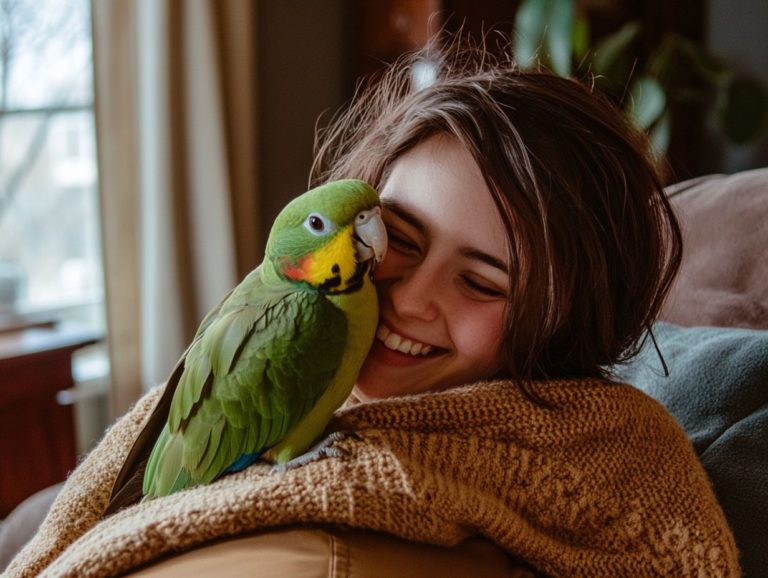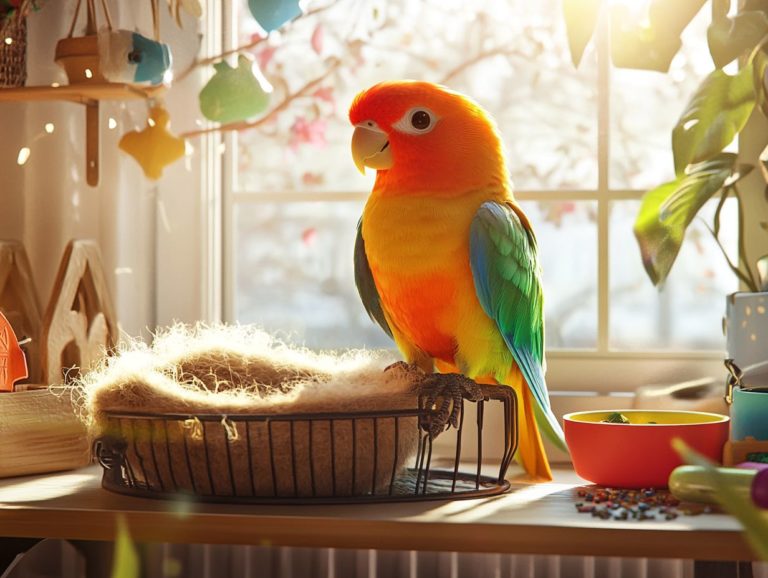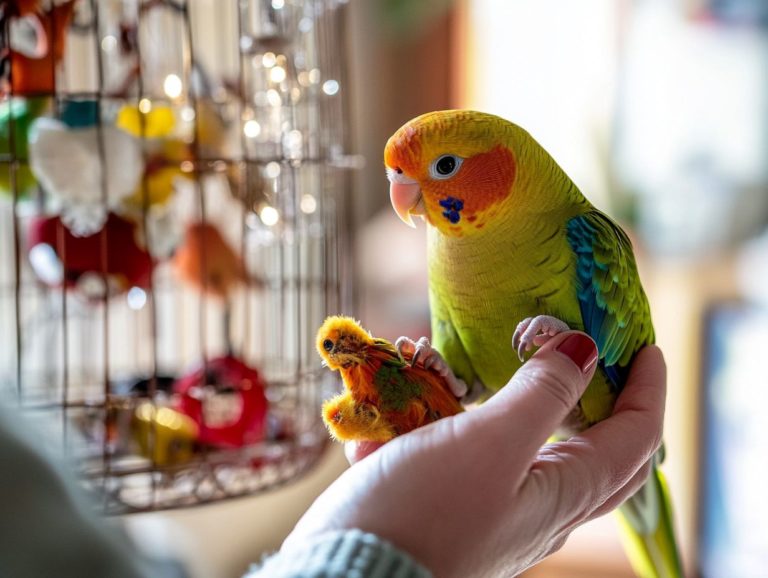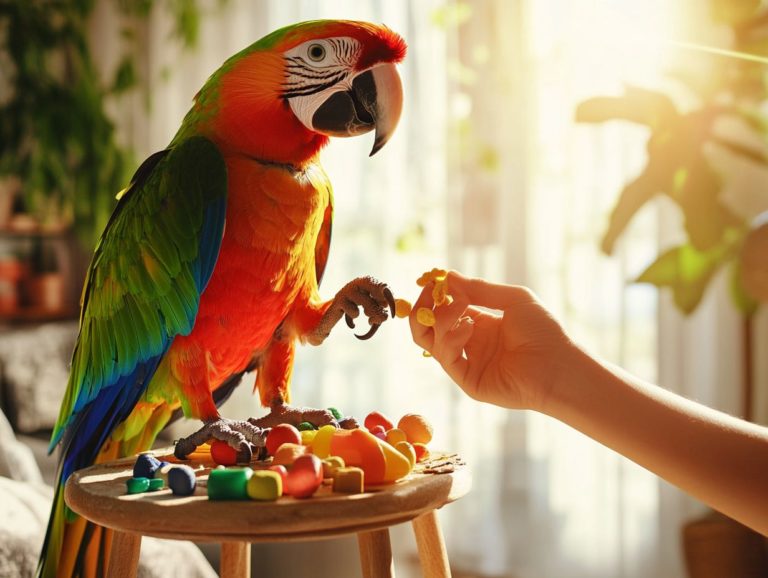How to Help a Bird in Need Before Adoption
Caring for a bird in distress can be both a rewarding and challenging experience. Whether you’ve stumbled upon a feathered friend in need or are contemplating adopting one, it’s essential to understand how to assess its condition and provide temporary care effectively.
This guide will equip you with the skills to identify signs of illness or injury, gather essential supplies, and create a safe environment for the bird. You ll also discover information about reputable rescue organizations and the adoption process.
With the right knowledge at your fingertips, you have the power to make a meaningful difference in a bird’s life.
Contents
- Key Takeaways:
- Preparing for a Bird in Need
- How to Identify a Bird in Need
- Providing Temporary Care for a Bird
- Connecting with Rescue Organizations
- Frequently Asked Questions
- Found a bird in need? Here s what to do!
- Should I try to care for the bird on my own before adoption, especially if I might lack experience in specialized animal care?
- What should I do if I am unable to locate a local bird rescue organization?
- Can I keep the bird as a pet before finding it a permanent home?
- What should I do if the bird is injured, and how can I ensure its safety while handling it?
- How can I prepare for adopting a bird in need by understanding its species and unique behaviors?
Key Takeaways:
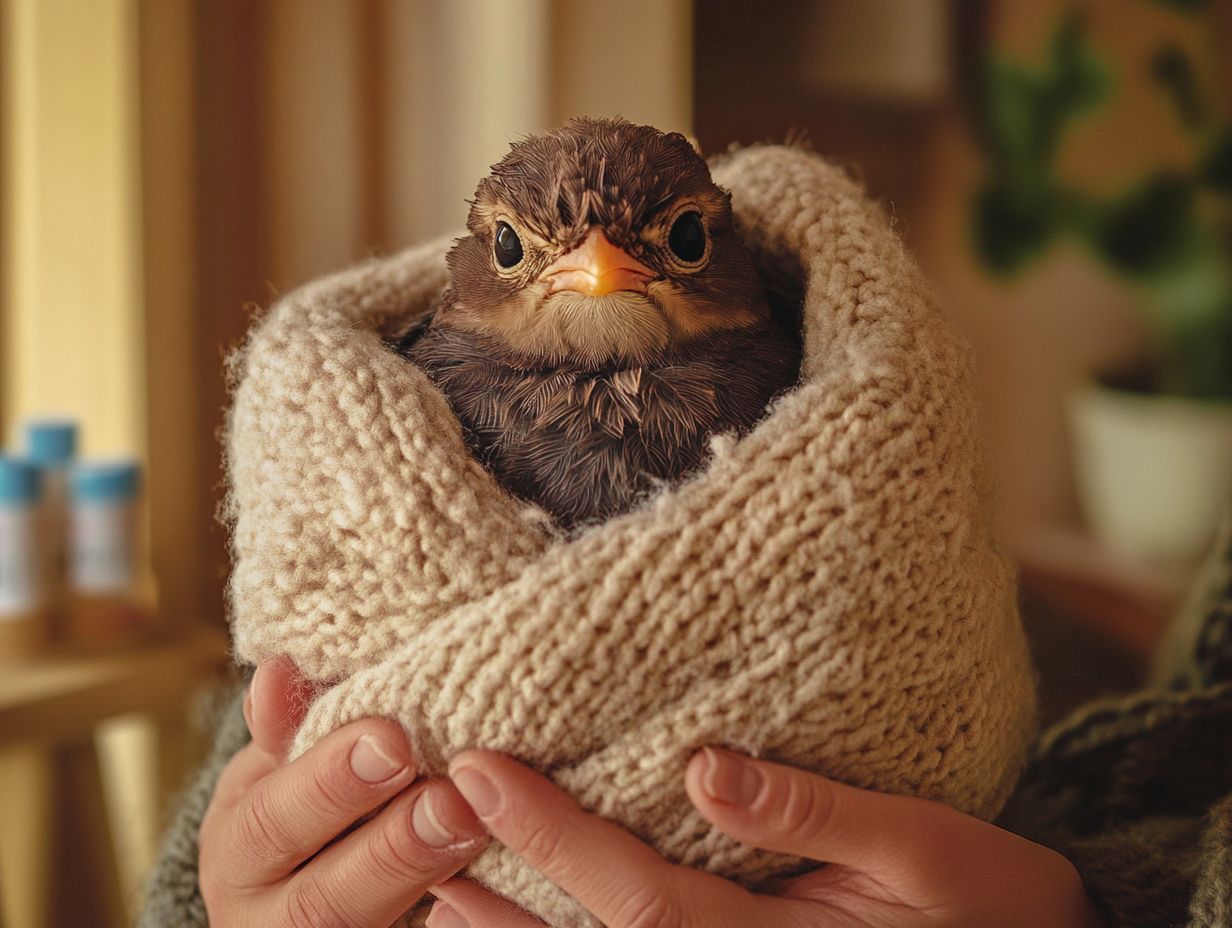
- Assess your ability and gather necessary supplies before helping a bird in need. This will ensure you can provide proper care and support.
- Learn to identify signs of illness or injury to determine the level of care needed.
- Create a safe environment and provide proper feeding. Contact rescue groups for more help.
Preparing for a Bird in Need
Preparing for a bird in need is a compassionate endeavor that demands your careful attention to various factors. Consider the specific species and their unique dietary needs. Additionally, learning how to support bird adoption through donations can help improve their living conditions. Be aware of their medical history and past experiences with humans, as these will significantly impact their interactions and acclimation process.
With thoughtful preparation, you can create a cozy haven that makes your bird feel at home. This ensures a safe and comfortable environment, fostering trust and minimizing aggressive behavior, ultimately promoting the bird’s welfare and successful rehabilitation.
Understanding the bird s needs and exhibiting patience during this transition is essential. Make sure your home is conducive to their well-being and that you possess the necessary resources and knowledge for their care.
Assessing Your Ability to Care for a Bird
Assessing your ability to care for a bird is crucial for creating a caring space that promotes comfort and trust, while also addressing any problems a bird may have due to past experiences and aggressive behavior.
Understanding the specific needs of different bird species is essential, as each one comes with its own unique requirements and quirks. Reflecting on your past experiences with pets, evaluating your current resources, and considering the level of commitment you can offer will significantly impact the well-being of the bird in your care.
Engaging with community support can offer valuable insights and resources, enabling you to make informed decisions. Being ready to adapt your living space to accommodate the distinctive characteristics and behaviors of your new feathery companion can lead to a fulfilling relationship for both of you.
Gathering Necessary Supplies
Gathering the essential supplies for your bird is crucial to creating a comfortable and safe environment. This means everything from the right feeding materials to appropriate cleaning products and engaging toys, which will support their well-being and happiness.
Alongside a spacious and secure cage that allows for movement and social interaction, selecting the right feeding dishes is vital for maintaining a healthy diet. Your bird will thrive on fresh fruits, vegetables, and high-quality seeds, so it’s important to present these in a way that’s easily accessible for them.
Incorporating toys that stimulate mental activity is key to preventing boredom; a variety of textures and colors can truly enhance their daily experience. Cleanliness is paramount for your bird’s health, so having dependable cleaning supplies at your disposal is a must.
Don’t wait! Regular veterinary visits are crucial for keeping your bird healthy and happy. Maintaining an environment that fosters well-being and minimizes potential stressors for your bird is essential.
How to Identify a Bird in Need
Identifying a bird in need is essential for its welfare. This requires you to engage in careful observation, looking for signs of illness or injury. If you do find an abandoned bird, knowing how to report abandoned birds for rescue is crucial. You’ll also want to be attuned to behavioral cues that may signal distress or discomfort.
Often, this understanding will lead you to seek intervention from local wildlife rehabilitators, such as Dr. Laurie Hess, or veterinary care providers, ensuring that the bird receives the help it desperately needs.
Signs of Illness or Injury
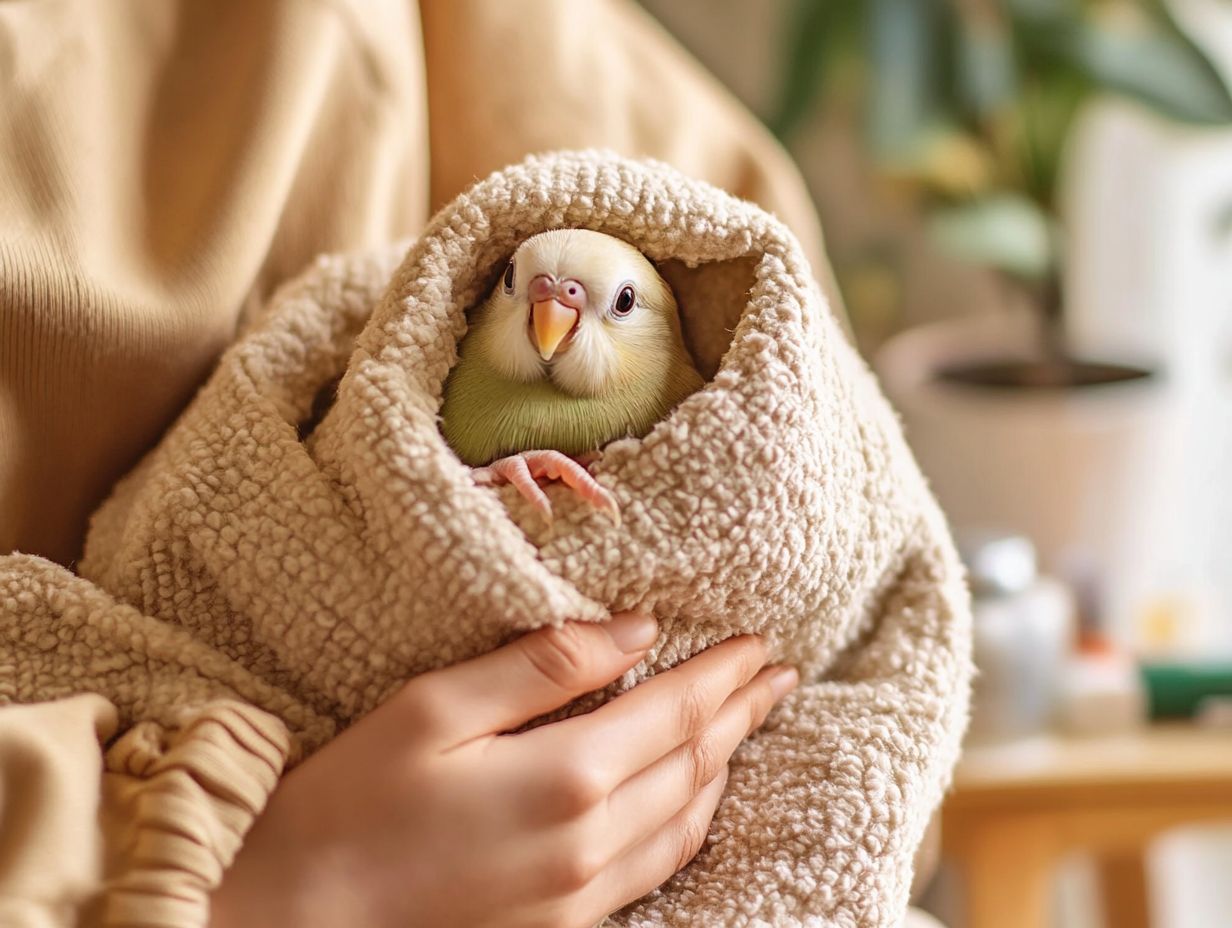
Signs of illness or injury in birds can appear in various ways. Look for changes in appearance, lethargy, or unusual behaviors.
These signs require immediate veterinary care or a call to a wildlife rehabilitation center.
As a bird owner or observer, it s essential to stay alert for indicators such as ruffled feathers, excessive vocalization, or difficulty in movement. These can point to underlying health issues.
Early detection is key! The sooner you help an affected bird, the better its chances of recovery. Remember, birds are experts at hiding their illnesses, so your attentive observation is incredibly important.
Act quickly! If you see a bird showing unusual signs, reach out immediately to a qualified veterinary specialist or your local rehabilitation center.
These resources can be life-saving, providing expert diagnoses and effective treatment plans to help ensure the bird’s swift return to health.
Behavioral Cues
Behavioral cues in birds, like shifts in communication patterns or aggressive displays, offer invaluable insights into their emotional states. Understanding these cues is vital for meeting their needs and building trust through socialization.
Recognizing these cues is crucial since they often reflect the bird’s comfort level in their environment and with you, their human companion.
For example, an enthusiastic chirp means the bird feels secure and engaged. In contrast, sudden aggression may indicate stress or discomfort.
By observing behaviors like preening, vocalization changes, and body posture, you can gather essential information to create a nurturing atmosphere.
Paying attention to these signals allows you to strengthen your bond with your feathered friends, ensuring a harmonious relationship based on understanding and empathy.
Providing Temporary Care for a Bird
Providing temporary care for a bird involves creating a safe and comfortable environment that meets its basic needs. Focus on proper feeding and hydration while ensuring the space is stress-free.
This process often requires community support and sometimes veterinary care to facilitate optimal recovery.
Creating a Safe and Comfortable Environment
Creating a cozy, safe space for your bird is crucial! It helps your feathered friend thrive. Consider its species-specific needs along with proper cleaning practices and regular observation.
One effective way to establish such a habitat is by selecting a cage that’s the right size. It should allow your bird to move freely and provide ample space for toys and perches.
Regular observation is key. It lets you spot any signs of stress or illness, ensuring you can step in at the right moment.
In terms of cleaning, a routine that prioritizes hygiene is essential. This helps prevent diseases that could affect your bird.
Opt for natural, non-toxic cleaning solutions to keep the environment safe. Also, regularly inspect perches and toys to maintain a healthy habitat that caters to your bird s unique needs.
Feeding and Hydration
Feeding and hydration are essential for caring for a bird. You need to grasp its specific dietary needs and ensure it has access to fresh food and water to thrive comfortably.
Effective dietary management is vital for your bird s overall well-being and longevity. Each species has unique nutritional requirements, which may include a blend of seeds, fruits, vegetables, and specially formulated pellets.
Hydration is equally important. Fresh, clean water should always be available, and incorporating water-rich foods can significantly boost their fluid intake.
Engaging with community support systems, like local avian clubs and online forums, can greatly assist you in sourcing high-quality supplies. This collaboration enhances your access to resources and offers valuable insights on veterinary care.
Connecting with Rescue Organizations
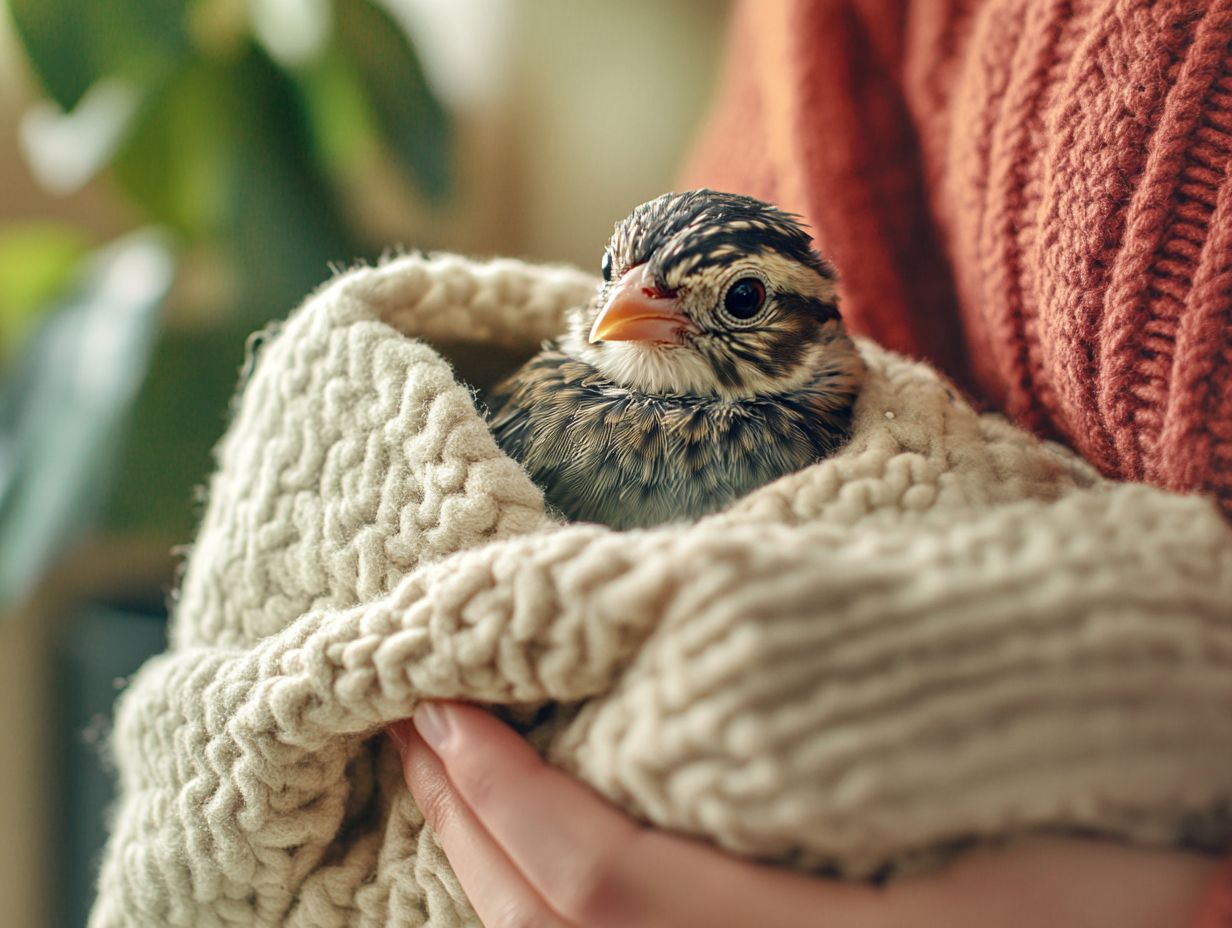
Connecting with rescue organizations can be a thrilling first step in caring for a bird in need! To ensure a smooth transition, check out how to prepare for bird adoption day. These organizations provide invaluable resources, information, and community support that can greatly enhance the adoption process.
They also help in urgent situations, ensuring you have the assistance and guidance required to make a meaningful difference in the lives of rescued birds.
Locating and Contacting Reputable Rescue Groups
Locating and contacting reputable rescue groups is essential for ensuring that a bird receives the proper care and support it needs. For a deeper insight into this process, refer to understanding bird adoption, as it fosters trust between caregivers and organizations dedicated to helping injured animals recover.
These organizations provide immediate help and also educate the community on the intricacies of bird care. Begin your journey by researching local wildlife centers or rescues that focus on birds to gather relevant information.
Engaging with online forums or social media groups can provide valuable recommendations based on firsthand experiences, helping you build a supportive network within the community.
Once you’ve identified potential rescues, reach out with specific inquiries about their services and protocols. This proactive approach facilitates a dialogue, ensuring that the bird receives professional intervention when it matters most. Additionally, consider exploring local resources for bird adoption support to enhance your efforts.
Understanding the Adoption Process
Understanding the adoption process through rescue organizations is essential for you as a prospective bird owner. It offers valuable insights into the requirements and responsibilities involved.
Your journey typically begins with a form, where you ll share your background, previous pet ownership experiences, and your readiness to welcome a new friend into your life. Once your form is submitted, a thorough home assessment will be conducted to ensure that your environment is safe and nurturing for the bird.
This assessment establishes a foundation of trust between you and the organization, reinforcing your shared commitment to animal welfare.
Once the adoption is finalized, ongoing support is often available to assist you in adjusting and bonding with your new feathered friend, ensuring a smooth transition into their forever home.
Frequently Asked Questions
Found a bird in need? Here s what to do!
If you have found a bird in need, the first thing to do is contact a local animal shelter or bird rescue organization. They can offer you the necessary guidance and resources, including understanding the needs of rescued birds, to help the bird.
Should I try to care for the bird on my own before adoption, especially if I might lack experience in specialized animal care?
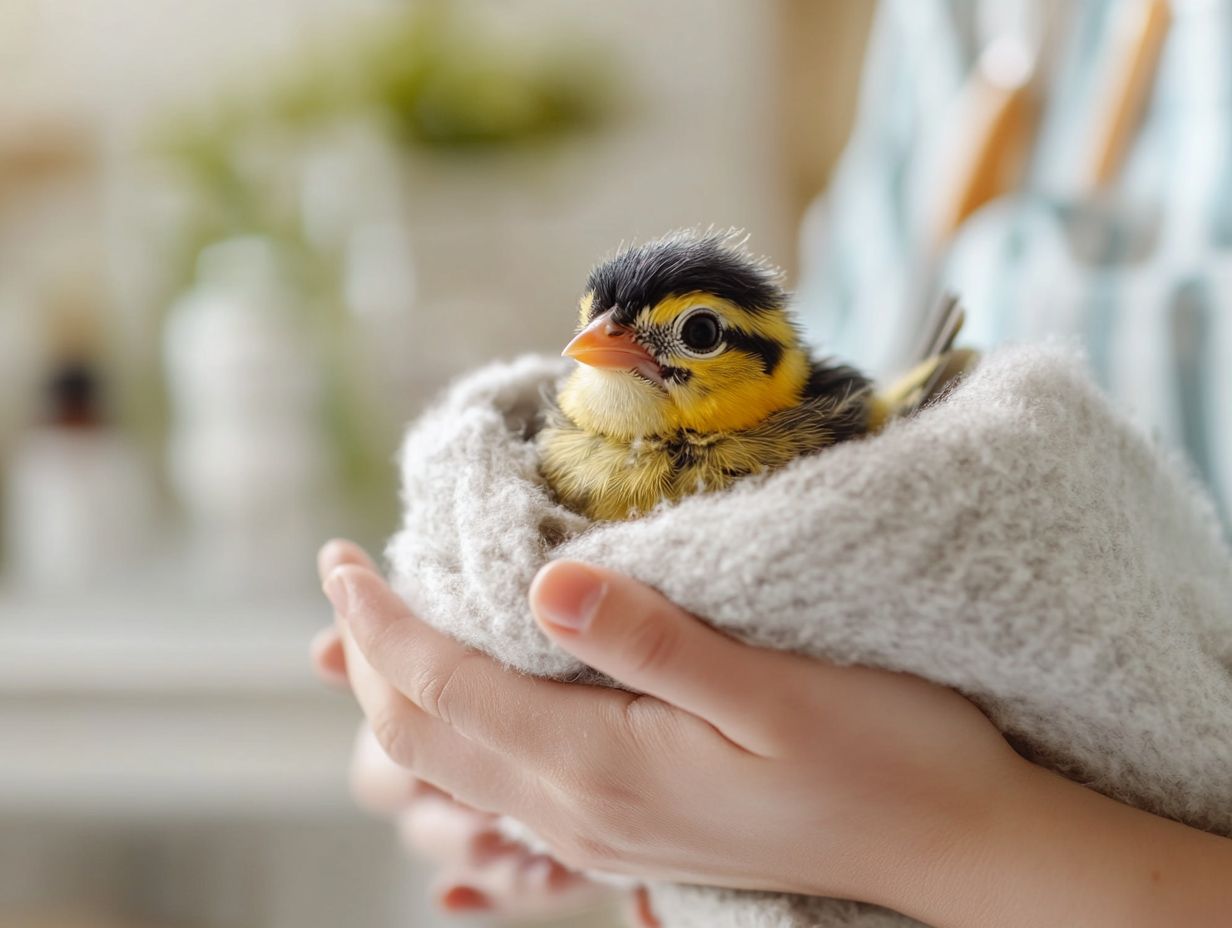
It is not recommended to try and care for a bird on your own, as they require specialized care and expertise. Instead, consider reaching out to the professionals at a bird rescue organization or animal shelter, and learn how to support your local bird rescue efforts.
What should I do if I am unable to locate a local bird rescue organization?
If you cannot locate a local bird rescue organization, reach out to a veterinarian who specializes in exotic birds. They may be able to provide you with guidance or refer you to a suitable organization.
Can I keep the bird as a pet before finding it a permanent home?
No, it is not recommended to keep the bird as a pet before finding it a permanent home. Remember that birds are not domesticated animals and require specialized care and living conditions.
What should I do if the bird is injured, and how can I ensure its safety while handling it?
If the bird is injured, act fast! Get help from a veterinarian or animal hospital right away.
They will provide the necessary treatment for its injury.
How can I prepare for adopting a bird in need by understanding its species and unique behaviors?
Before adopting, learn about the proper care, diet, and living conditions for the specific type of bird.
You can also contact local bird rescue organizations for helpful resources.

